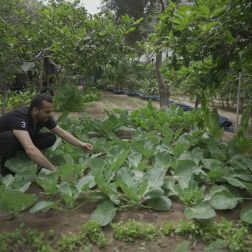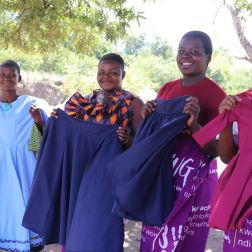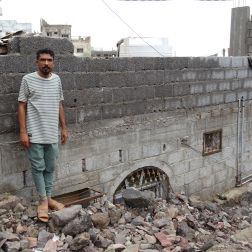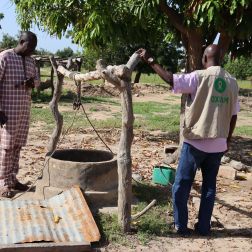- 5 mins read time
- Published: 17th May 2017
Behind the five million ‘Syrian refugee’ tags are individual stories of love, loss, and hope
A smile lights up her honey-colored eyes. Delicate gold droplets dangle from her small ears. Her name—Warda—means rose in Arabic. She could have been a carefree 18-year-old law student in London, an aspiring actress in Paris, or a trendy blogger in NYC.
Instead, Warda lives in a tent in Lebanon’s Bekaa Valley. She is pregnant with her second child and lives with her 23-year-old husband Hassan. Warda is dressed in black from head to toe, in mourning for her mother who was killed 10 days ago in Homs when a missile flattened the family home. Her earrings are her last personal belonging.
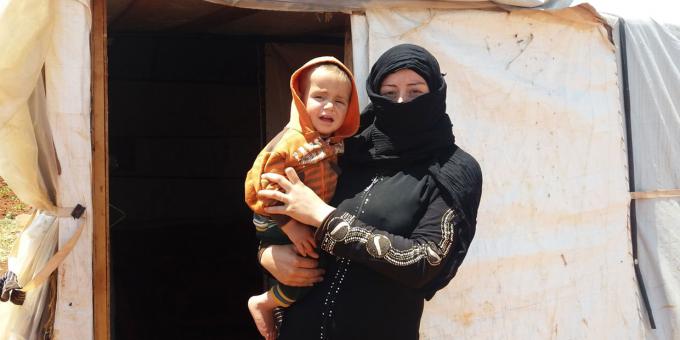
Behind her smile is a storm of grief, questions and hopes that never let up. The young woman is one of five million Syrians who have fled their war-torn country and are registered as refugees in Syria’s neighboring countries—a number that is more than the population of Ireland. Half of the pre-war population of 22 million has been uprooted. A quarter has crossed borders in search for safety. Warda was 13 when she left her home area in Homs governorate. She has not seen her father since.
“Last time I saw my mother, she came to spend a month. But she left before my first child was born,” says Warda, scrolling through photos on her mobile phone. She shows me a picture of her mother Hanane, beaming as she stands next to her on her wedding day. Warda was dressed in white, her hair in an elaborate up-do, her eyes lined with kohl. “We got married here in the camp. There was dancing and singing. Life has to go on,” she says.
But her life is anything but normal. Her son Jaafar is now 13 months old. Like so many Syrian children born in Lebanon, he has no official papers, and hence no nationality. Jaafar is neither Syrian nor Lebanese. Would his own country even allow him back in after the war?
The lack of documentation for newborns resulting from the amount and cost of red tape is one of many challenges Syrian refugees face in neighboring countries such as Lebanon. They have little-to-no access to the job market, they contract debts to complement the little humanitarian aid they receive, they don’t have full access to education, and they live with the constant fear of deportation.
Yet those who have turned towards rich third countries have either found closed doors when they attempted to travel, or have risked their lives on rickety boats to reach the shores of Europe. Five million refugees now live in limbo, waiting for an elusive peace to go back home or for an improbable plane ticket to Europe or North America. That’s half a million people spread across dozens of cities around the world. In Lebanon, one in five inhabitants is now a refugee.
Not far from Warda’s tent, in another informal settlement built on privately-owned agricultural land, Abou Imad, 53, sips tea while waiting for the young men and women of his family to come back from a day in the fields. Bent in two under the baking sun, they would have harvested onions or planted potatoes for less than $10 per day. Next to him, his two youngest girls sit quietly. Though they had a spot in the local school—the Lebanese government having opened public schools to around half of the Syrian children—they stopped going because their father can’t afford the bus ride. “What will happen to this generation?” he asks. “That’s what worries me most. They are growing up to be illiterate. We, the older generation, have nothing left to lose. But them?”
Abou Imad thought he had seen it all. A soldier in the Syrian army that fought in the Lebanon civil war (1975-1990), he went on to become a truck driver criss-crossing the Middle East and delivering goods to US-occupied Iraq in 2004. In 2010, he settled in his hometown of Raqqa, but little did he know that the terrorist group ISIS would drive him out of what became a few years later the heart of its self-proclaimed caliphate in Syria.
“Look at this woman. Dressed like this, she would not have been able to stick her head out of the door. They would have killed her,” he says pointing to his new daughter-in-law, Ahlam, which means dreams in Arabic. A fresh-faced, raven-haired young Syrian woman wearing a red dress, she left Raqqa a few months ago. She took a perilous journey through Iraq and Jordan to reach Lebanon and marry Abou Imad’s son. Now a refugee, she has been embraced by her new family, and can live without the threat of extremism.
But Abou Imad’s heart stayed in Syria and he wants to see his homeland even just one last time. “You see how big the ocean is? Even the smallest fish, after travelling far and wide, will come back to rest under that same rock it was born under.”
The names in this story have been changed to protect the security of the individuals.
We are providing lifesaving aid to displaced people in the Middle East, and we’re helping families meet some of their basic needs as they travel beyond the region to seek safety.
The entry posted by Joelle Bassoul (@JoBassoul), Oxfam Media advisor, Syria Response, on 3 April 2017.
Photo: Warda, with her child Jaafar and husband Hassan, lives in a tent in Lebanon's Bekaa Valley after leaving her home in Syria. Credit: Joelle Bassoul/Oxfam
